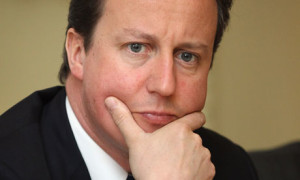David Cameron’s Future Hangs in the Balance
 For a Prime Minister who just presided over a riotously popular Olympic games, David Cameron’s job isn’t as secure as it should be. His Conservative Party is sinking in the polls, and his position is becoming increasingly dependent on his own personal popularity and an extremely fragile balance between his own party and their coalition partners in the centrist Liberal Democrats. Where did it all go wrong?
For a Prime Minister who just presided over a riotously popular Olympic games, David Cameron’s job isn’t as secure as it should be. His Conservative Party is sinking in the polls, and his position is becoming increasingly dependent on his own personal popularity and an extremely fragile balance between his own party and their coalition partners in the centrist Liberal Democrats. Where did it all go wrong?
Cameron’s troubles have their roots in 2011, when he was forced to face down public anger over Health Secretary Andrew Lansley’s chaotic reforms to the National Health Service. They intensified in March of this year, with Chancellor George Osborne’s deeply unpopular budget. A modest tax cut for the wealthy was compounded by spending cuts and tax increases that hit the working and middle classes hardest, and the ‘Tories” were restored to their traditional place in the public mind as a party of the rich, for the rich.
Next, at the height of the scandal over the illegal hacking of voicemail messages by journalists working for Rupert Murdoch’s News Corporation, both Cameron and Culture and Media Secretary Jeremy Hunt were accused of high-level corruption and cronyism regarding Murdoch’s bid for television company BSkyB. Miraculously, Hunt kept his job, but the controversy cemented the public perception of a government in the pocket of wealthy interests.
Meanwhile, the government’s central, defining policy has failed. The coalition was elected in 2010 on a mandate to mend Britain’s economy, reduce the national debt and balance the budget. Chancellor Osborne embarked on an ambitious programme of deep spending cuts. Now the economy is flatlining, the national debt is skyrocketing and the deficit sits at £14billion and rising.
It’s an established fact of British politics that when the going gets tough, the Tories get mean. With just a third of the population planning to vote Conservative at the next election, many Conservative members and backbenchers are demanding a shift to the right. 14 Conservative MPs demanded a leadership contest, while media speculation intensified over the leadership hopes of London Mayor Boris Johnson. Johnson’s popularity, buoyed by his visibility during the Olympic games, is increasingly a cause for concern among the Prime Minister’s loyal circle of ‘Cameroons’. Cameron responded with a cabinet reshuffle that installed a number of leading right-wingers in senior positions.
Cameron is also facing growing discontent among the Liberal Democrats, his coalition partners, who have been brutally punished for a string of broken promises. Liberal Democrat leader Nick Clegg’s perceived failures to stop a rise in university tuition fees and healthcare reforms have caused students and the party’s left wing to desert them en masse, followed by catastrophes in elections to local councils and the Scottish parliament. To try and shore up some support, the party are pursuing an agenda of ‘differentiation’ with the Tories, blocking right-wing policies and taking credit for more ‘progressive’ ones. Cameron’s problem here is twofold: his backbenchers are outraged at what they perceive as excessive restraint to appease their coalition partners, while the Liberal Democrats are hijacking his most popular initiatives.
The Labour Party now poses a clear threat. It is ten points ahead in the polls, and leader Ed Miliband appears to have overcome early wobbles with a number of smart tactical calls. He outflanked and damaged the Tories with quick and brave action on healthcare, taxes and phone-hacking, while his comprehensive policy review is beginning to formulate an attractive vision of ‘responsible capitalism’ that displays an impressive grasp of the new political center.
Miliband is also beginning to make very public overtures to disenchanted Liberal Democrats in an attempt to split the coalition – particularly the left-leaning Business Secretary Vince Cable. Cable remains popular among the British public, with a recent poll suggesting his leadership would win 50 seats for his party at the next election – 18 more than under Clegg. He harbours a fierce dislike of the Conservatives, and is able to attack them from the safety of his cabinet post thanks to his prominence in his own party. His apparent loyalty to Clegg should rule out any imminent leadership challenge, but he could become a significant rallying point for discontented Liberal Democrats if the Tories don’t moderate their rightwards drift.
David Cameron is worried. As his party drags him to the right and his coalition partners grumble, he’s losing his footing on the center ground and facing questions over his leadership. His government is unpopular and divided, while the Labour Party is growing in confidence and regaining public support. Despite all this, he is far from doomed. Most importantly, his personal favourability ratings remain far ahead of Miliband’s, who has yet to convince the public of his Prime Ministerial qualities. The Liberal Democrats are unlikely to force an election before 2015 as long as Clegg remains leader and the party remains unpopular. A lot can happen in three years, but Cameron’s best bet now is to just sit tight and hope that things improve.